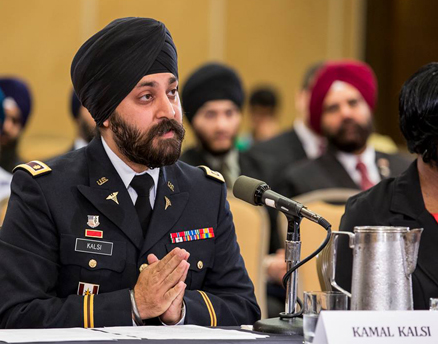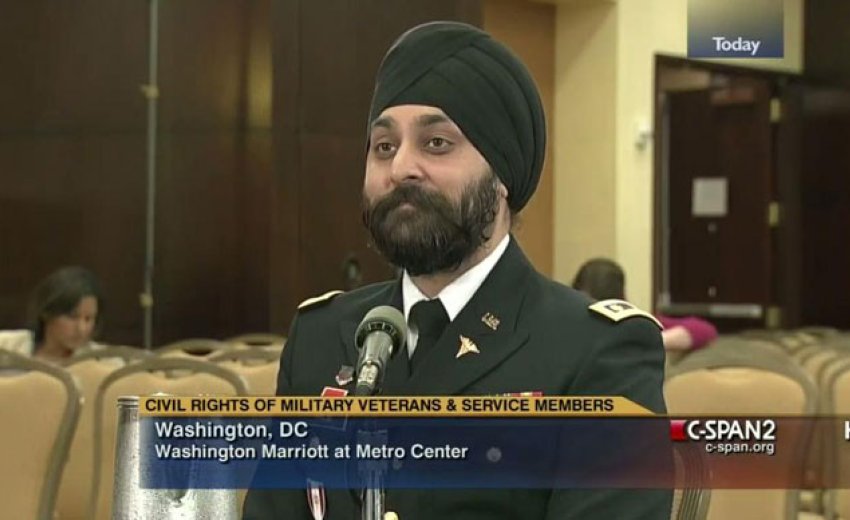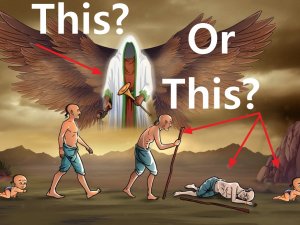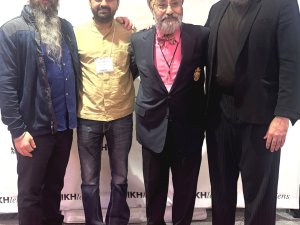SikhNet recently got a chance to speak with Major Kamaljeet Kalsi, a doctor in the U.S. military.
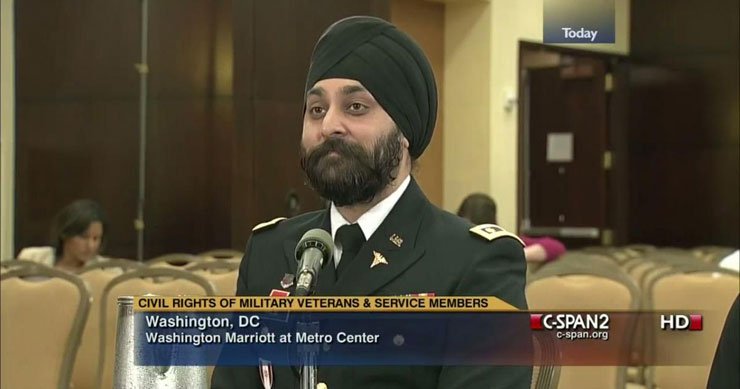
2/5/15
SikhNet: What inspired you to join the military?
Major Kalsi: I've always had the desire to serve ever since I was a little kid. That stems from coming from three generations of military. My father and my grandfather were both in the Indian air-force. My great grandfather was in the royal British army. Sikhs have a long history of military service and I just wanted to be a part of that. I wanted to be able to connect to that heritage.
You must stand out as a keshdhari turbaned Sikh.
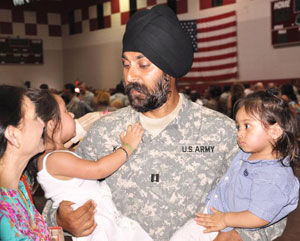 It's funny
because whenever someone asks me, just the other day I had someone
ask me, "So where you from?" I always tell them I'm from
Jersey. That sort of takes them aback. You see a person that looks
different and in many people's eyes that means to them that this person may not be from the United States.
This is what we're up against right now. "What does an American
look like?" Just today President Barack Obama gave a speech at the National Prayer Breakfast about religion and religious intolerance, how folks from around the world use religion as an excuse to do
some very, very horrible things. He was of course referencing ISIS in
this regard, but to me religion is a force of good and it helps me
with my discipline. It helps me with my humanity and my desire to
serve. All the great things that I think are a part of my life have
come to be because of my religion. I feel my religion makes me a
better soldier at the end of the day and the army recognizes this.
That's why we have a whole chaplains core. When we deploy to the
front lines of war, you send soldiers, guns and bullets but you also
send doctors, and right along side of those doctors, you have chaplains. If the military didn't recognize the importance of religion, than
why would they send chaplains to the front lines of war?
It's funny
because whenever someone asks me, just the other day I had someone
ask me, "So where you from?" I always tell them I'm from
Jersey. That sort of takes them aback. You see a person that looks
different and in many people's eyes that means to them that this person may not be from the United States.
This is what we're up against right now. "What does an American
look like?" Just today President Barack Obama gave a speech at the National Prayer Breakfast about religion and religious intolerance, how folks from around the world use religion as an excuse to do
some very, very horrible things. He was of course referencing ISIS in
this regard, but to me religion is a force of good and it helps me
with my discipline. It helps me with my humanity and my desire to
serve. All the great things that I think are a part of my life have
come to be because of my religion. I feel my religion makes me a
better soldier at the end of the day and the army recognizes this.
That's why we have a whole chaplains core. When we deploy to the
front lines of war, you send soldiers, guns and bullets but you also
send doctors, and right along side of those doctors, you have chaplains. If the military didn't recognize the importance of religion, than
why would they send chaplains to the front lines of war?
Do you have any particular stories that illustrate what it means for you to serve in the military?
I'll share a picture with you and I'll give you a story to connect with it. When we were there in Afghanistan, we were in Helmand province, it was one of the bloodiest zones this year. We had many, many casualties come in and we had a great team. There were certain days that stick out in your memory. I think right around that time this photo was taken - you see the team working on a patient. We received a bunch of casualties from an IED explosion and we worked on those casualties for a while. At the end of it, one of the soldiers grabbed my arm and said, "Thank you brother." That meant so much to me because, at the end of the day, that's our proof of concept. The soldiers don't care that I have a turban. They don't care that I have a beard. In fact, the folks that I deployed with didn't even see my turban and beard after a while. They just saw another American soldier. So this proof of concept that meant so much to me because we've been saying all along that it doesn't matter what you look like, we all bleed the same. We're all the same inside.
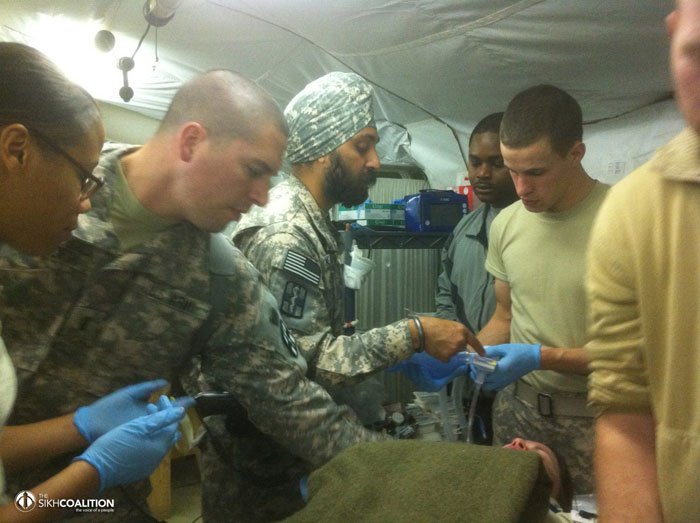
We often encounter this push back from people saying, "Well what about the uniform? By wearing a turban and a beard you somehow degrade this concept of uniformity." What I would like to say in response to that is there was a military that cared a hell of a lot about uniform. They cared a hell of a lot that people looked the same. We defeated them in World Wars 1 and 2. I have no interest in letting the United States become like that empire. We've always been better because of our diversity. We're better because our country welcomed African Americans, welcomed women in the military and most recently we welcomed LGBT soldiers. Diversity and flexibility has been a both hallmark and strength of the United States military. People that don't understand that, people that fight against diversity in the military, really are the enemies of our nation.
Wow. That was very well said. People reading this can't hear your voice or be able to pick up the humor in your voice. You have an obvious candor. Yet you've been in some very serious situations. What has been your experience with racism in the military in general? How have you dealt with it and how have you been able to turn it around.
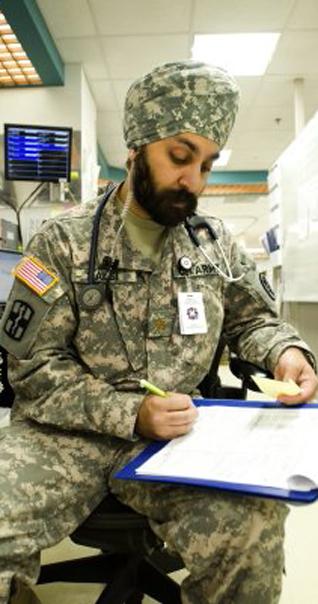 I've
never had any issue with my fellow soldiers that I worked with or
deployed with. I've been in contact, over the years as an ER doctor,
with thousands and thousands of soldiers. I've never had an issue.
Nobody ever said, "Hey you've got a turban and beard, don't
take care of my gunshot wound," or "Don't take care of my
arm that has just been blown off." No one cares. As you can see from
that vicious meme, there are people that supposedly call themselves
patriots that sort of in the dark recesses of the internet feel like
they need to comment on this whole uniformity issue. The hateful
comments are the same comments that people made about black soldiers
when black soldiers were first being integrated in the army, and then
about female soldiers. It's the same sort of rhetoric that they use
to try to justify hanging onto the status quo which is un-American at
the end of the day. Even now, patriotic Sikh Americans can't serve
freely in the US military. We have to apply for an accommodation, but
the whole madness of the situation is that you can't apply for the
accommodation until you're accepted into the military. So, as a Sikh,
you would have to cut your hair and remove your turban in order to
apply for the religious accommodation, which you may or may not get.
It's a horrible catch-22 that I think most Sikh Americans would feel
nauseated about.
I've
never had any issue with my fellow soldiers that I worked with or
deployed with. I've been in contact, over the years as an ER doctor,
with thousands and thousands of soldiers. I've never had an issue.
Nobody ever said, "Hey you've got a turban and beard, don't
take care of my gunshot wound," or "Don't take care of my
arm that has just been blown off." No one cares. As you can see from
that vicious meme, there are people that supposedly call themselves
patriots that sort of in the dark recesses of the internet feel like
they need to comment on this whole uniformity issue. The hateful
comments are the same comments that people made about black soldiers
when black soldiers were first being integrated in the army, and then
about female soldiers. It's the same sort of rhetoric that they use
to try to justify hanging onto the status quo which is un-American at
the end of the day. Even now, patriotic Sikh Americans can't serve
freely in the US military. We have to apply for an accommodation, but
the whole madness of the situation is that you can't apply for the
accommodation until you're accepted into the military. So, as a Sikh,
you would have to cut your hair and remove your turban in order to
apply for the religious accommodation, which you may or may not get.
It's a horrible catch-22 that I think most Sikh Americans would feel
nauseated about.
And incensed perhaps. But we are thankful that you are in there, as well as other Sikh Americans that are serving. You must know that you are a huge point of pride for Sikhs.
Yes, I'm proud that I can do this. It's such an honor to be able to serve in the United States military. People sometimes forget. They think that military service is all about guns and bullets, but what they don't realize is that the vast majority of work we do in the military across the world is just humanitarian work. For as many soldiers that I took care of when I was there in Afghanistan, we took care of probably just as many nationals as we did soldiers. Kids that had fallen into fire pits or had fallen into the local river... I remember there was this one young girl that we took care of that had a congenital anomaly, a very large tongue she was born with. An EMT friend I work with took care of her tongue. The village chief was so happy with us that he went around and showed us where all the IED's were buried. He pointed out all the bad guys. It just goes to show you that winning hearts and minds doesn't have to be done with military equipment, it can be done with doing the right thing. You don't need guns and bullets for that. Our military campaign right now -just to make a clear point- is certainly about religious freedom which is a core philosophy of Americans. It's one of the things that brought people to America to begin with. But our military campaign is really about employment discrimination, equal opportunity at the work place. Nobody should be able to turn a Sikh away just because we have a turban and a beard. The United States military, being the largest employer in the United States, would set a horrendous precedent if they're able to turn away patriotic Sikh Americans just because we have a turban and beard.
Can you explain to us civilians the meaning of the meme. It's clearly derogatory but I'm not sure really what it means...
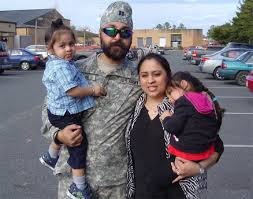 It
implies that I have to demand a salute or that I may not be deserving
of a salute. The tongue in cheek implication is that I'm
different, because I have a turban and a beard in uniform. It's very
divisive and ignorant. I think that's what the intent of the
moderator was, heheh,
destroy our military. There are people that you encounter in life
that build up society, that like to build things and that are
creative. Then you have other people in society that destroy things.
This person that put this meme out strikes me as somebody that likes
destroying things. It's meant to invoke a response from people that don't value diversity. If you read the comments in that forum in response
to that photo, there's some very, very hateful things that are being
said. I love it when people say, "He should go back to his
country." I'm from Jersey, hahahah! Where do you want me to go?
You want me to go back to the town I grew up in? You want me to go to
California, the town where I studied medicine? You want me to go back
to Texas or North Carolina where I served in the military? I mean
this is home for me.
It
implies that I have to demand a salute or that I may not be deserving
of a salute. The tongue in cheek implication is that I'm
different, because I have a turban and a beard in uniform. It's very
divisive and ignorant. I think that's what the intent of the
moderator was, heheh,
destroy our military. There are people that you encounter in life
that build up society, that like to build things and that are
creative. Then you have other people in society that destroy things.
This person that put this meme out strikes me as somebody that likes
destroying things. It's meant to invoke a response from people that don't value diversity. If you read the comments in that forum in response
to that photo, there's some very, very hateful things that are being
said. I love it when people say, "He should go back to his
country." I'm from Jersey, hahahah! Where do you want me to go?
You want me to go back to the town I grew up in? You want me to go to
California, the town where I studied medicine? You want me to go back
to Texas or North Carolina where I served in the military? I mean
this is home for me.
That meme was meant to incite derision and divisiveness. There are people that enjoy doing that without realizing the consequences of these actions. It's unfortunate and this is the type of sentiment that we've been talking about. We saw it right after 9/11 when we had the first Sikh die in a hate crime. We saw it in Wisconsin when Micheal Page killed innocent Sikhs just praying. We've seen it a number of times in New York city with people randomly, well not so randomly, attacking Sikhs. It's unfortunate and these sort of attacks, the hate motivated attacks, are on the rise.
The Southern Poverty Law Center, they do great work, they've been tracking statistics on hate crimes and the number of hate groups since the early 2000's and there's a notable rise since 2000 to 2001. Sikhs always get the short end of the stick, so we need to push back. We need to push back in a positive way. The way we do that is by service. So I think Sikhs serving in the military, Sikhs serving in the police, in EMS, as firefighters even if you serve without a uniform, serve in a hospital, that's valuable because it all helps to push back against this very, very negative stereotype that was created about us. This is an opportunity for all Sikh Americans to get to know our neighbors a little bit better.
I thank you for really backing up your words, it's really impactful when you say these things.
More specifically to this one situation we're going to be putting out a photo response to the meme. I'd like everybody to share that response meme with as many people as they can and start a conversation about who Sikh Americans are and what our values are. Talk about how we want to be able to serve freely in the United States. How we used to be able to do that before the 1980's, how we've served honorably in every major world war. I want people to start to have conversations, I want our community to sort of wake up and realize that these hate crimes, these attacks are getting worse, not getting better so we have to do something about it or it's going to have more dire consequences.
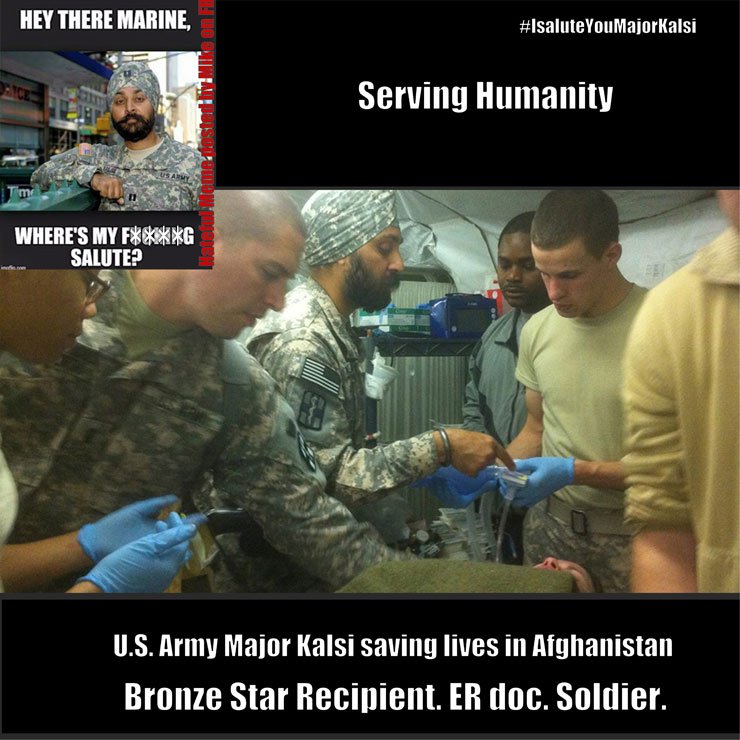
I have one more question. Do you have any advice for other Sikhs in America and the world about how to deal with discrimination and hatred?
I think Sikhs have always faced some level of discrimination from our inception. Back in the 16 and 1700's we were hunted by the Mughol empire to near extinction, until the Sikhs became a militant force, until we became militarized. Today in India we're trying to right the wrongs of 1984. Sikhs were hunted once again, and that sort of discrimination exists today here in the U.S. as well. When you go to apply for a job people might see your turban and beard and think that this is not a professional appearance or it's not the corporate image. Beards are sort of coming back into style now, but by and large a person with a turban and beard is not the typical image of an American. There is some cognitive dissonance with the turban and beard and the concept of being American and that's what we have to fix. We need a better PR campaign and a lot of great organizations including Sikh Coalition, Surat, SALDEF, National Sikh Campaign, they're working very, very hard to improve our image, our PR, but it's gonna take time. Unless the community really gets involved these efforts are not going anywhere.
I think the community really needs to get involved in whichever organization they feel is right for them but don't be apathetic. Don't just sit at home and read the news feed and say, "Wow, that's a horrible thing." Our Gurus meant for us to be a people of action, a people that care enough to get off their butts and change the world. So that's my challenge to my community, the community that I love, I challenge you guys to get up off your butts and do something. Don't take for granted that somebody else is gonna come to our rescue. We gotta dig ourselves out of this one.
Fantastic. I'd like to thank you for your time. I'm honored to speak with you. On behalf of SikhNet, and I'm sure all Sikhs, I just wanted to say we're very proud of you, thank you for your service. We certainly do salute you!
Hahah, thank you. It's an honor and a pleasure to speak with you.
